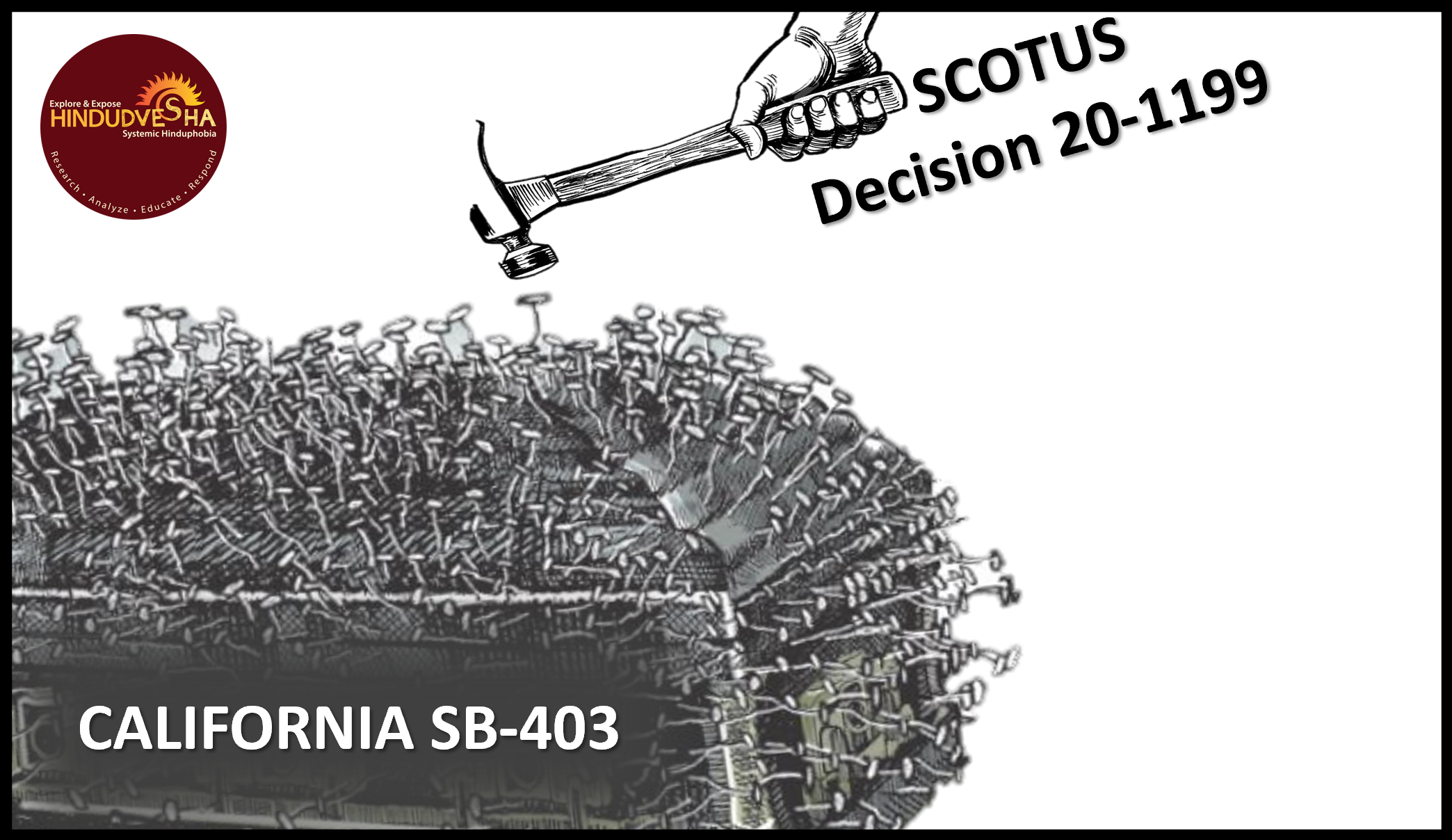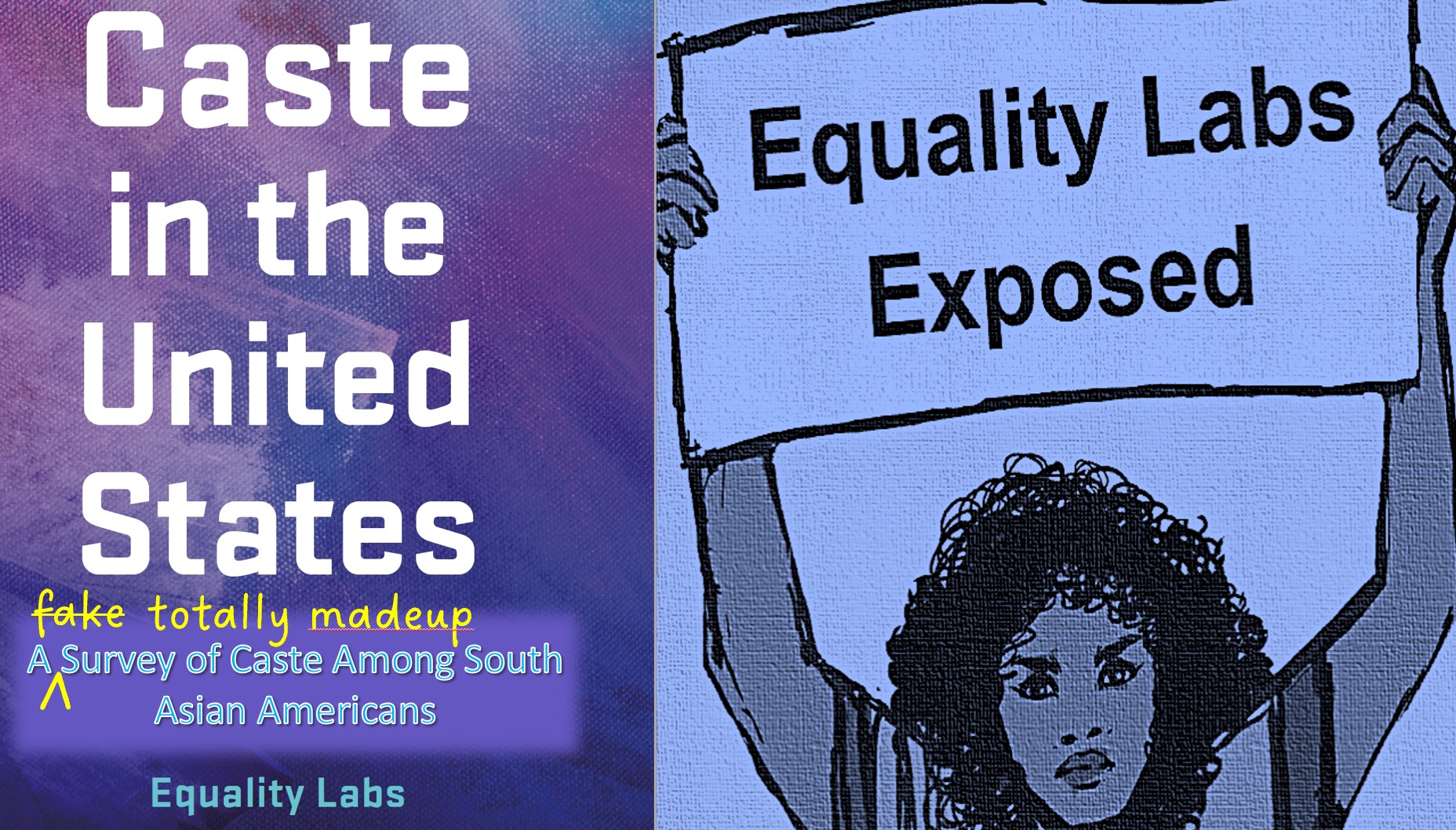The Supreme Court’s recent decision limiting the use of race criteria in college admissions on due process grounds may prove to be the last nail in California SB403’s coffin.
Background
Senator Aisha Wahab’s controversial bill SB403 seeks to point fingers at Hindus by adding caste to the protected categories under Title VII of the Civil Rights Act. Hindu groups realize the true intent of this bill, which is to facilitate fake caste discrimination lawsuits like the ill-fated John Doe vs. Cisco, Iyer, and Kompella. That suit was thrown out of court under existing law, and SB403 is intended to fix that.
 The bill’s principal backer is Thenmozhi Soundararajan of Equality Labs, an avowed anti-Brahmin and prejudiced anti-Hindu aligned with fundamentalist Christian interests, and Senator Aisha Wahab, is a political neophyte and Afghani Muslim. Neither of them has any recognized expertise in the subject of caste, and the sole database supporting the bill is a hateful unscientific survey by Equality Labs. In affirmation of this weak foundation, they have been revising and re-revising the bill’s text in response to Hindu objections. But the only word they cling to until Armageddon is “caste.”
The bill’s principal backer is Thenmozhi Soundararajan of Equality Labs, an avowed anti-Brahmin and prejudiced anti-Hindu aligned with fundamentalist Christian interests, and Senator Aisha Wahab, is a political neophyte and Afghani Muslim. Neither of them has any recognized expertise in the subject of caste, and the sole database supporting the bill is a hateful unscientific survey by Equality Labs. In affirmation of this weak foundation, they have been revising and re-revising the bill’s text in response to Hindu objections. But the only word they cling to until Armageddon is “caste.”
But that is precisely the point of contention. Both supporters and opponents of SB403 know that thanks to middle school education, the word “caste” immediately brings the word “Hindu” to the average American’s mind. Supporters hope, and opponents fear, that adding this word will portray Hindus as terrible racist abusers. Even worse, the bill pretends that the controversial and dynamic concept of “caste” is crystal clear, so much so that the bill does not even offer a definition. Nor does the bill provide any evidence of caste-based discrimination or say how caste differs from race.
Civil Rights vs. Due Process
No one disputes that historically, the civil rights of minorities have been compromised and denied, often in a cruel and indefensible manner. There is a profusion of evidence to that effect. Many genuine cases of civil rights infringement have been brought successfully. But there are standards that such cases must follow.
One prominent standard is the 14th Amendment’s guarantee of due process. Every citizen has the right to fair and equal treatment in any legal proceeding. If a law unfairly or disproportionately impacts only certain citizens, it violates due process. This is one reason why the latest Amendment of SB403 avoids references to geography or religion. However, in the process, it left “caste” completely undefined. A legal case with an undefined primary concept also raises due process issues.
The proponents of SB403 have missed why civil rights language is “facially neutral,” i.e., it does not point to any specific group of people. The reason is to avoid compromising the universal right to due process. They have also missed the fact that the word “caste” is NOT facially neutral. It points to Hindus. The due process argument is expected to render Senator Wahab’s Amendment legally unconstitutional.
Supreme Court Decision 20-1199
The recent Supreme Court decision on race in university admissions, No. 20-1199,[1] has bolstered the due process case against SB 403. The decision clarifies and reinforces the principle that remedies for discrimination must satisfy the Equal Protection clause. The case considers race closely related to caste since both are endogamous groups. Let us examine the significance of key excerpts from it :
- a) “The guarantee of equal protection cannot mean one thing when applied to one individual and something else when applied to a person of another color” [p. 15]
The key here is that “caste” signals “Hindus” to anyone schooled in the US. It is not an independent facially neutral category. The word “caste” violates the above since it creates an unwarranted prejudice of guilt toward Hindu defendants.
- b) “only two compelling interests .. permit race-based government action: remediating specific, identified instances of past discrimination that violated the Constitution or a statute .. (and) … human safety in prisons, such as a race riot.” [p. 15]
Since SB-403 justifies its existence as a remedy for “grave and pervasive” caste-based discrimination (“CBD”), it counts as “race-based government action.” However, it does not provide any specific, identified instances of CBD and does not provide any limits of time or scope. In its present form, SB 403 violates the above.
- c) “the Government must treat citizens as individuals, not as simply components of a racial, religious, sexual or national class ..” [p. 33]
SB 403 seeks to create a new class of individuals, even though it admits that existing classes cover the very same individuals. Whether randomly adding new categories as “clarifications” of existing ones is constitutional is a fundamental question.
- d) “Harvard’s and UNC’s race-conscious programs are unconstitutional because they rely on racial categories that are “imprecise,” “opaque,” and “arbitrary” [p. 52]
The foregoing means that SB403 is unconstitutional if the category “caste” is imprecise, opaque, and arbitrary. This is, in fact, the case. A great deal of scholarly debate and opinion can be cited about caste, including thousands of papers. It is neither clear nor precise. Even the list of disadvantaged castes used by the government of India for administrative purposes is not orthodox, mandatory, or religious.
- e) rejects studies that “have major methodological flaws,” are based on unreliable data, and do not “meet the basic tenets of rigorous social science research.” [p. 56]
This clause virtually demands that SB403 be rejected. Its justification is based on Equality Labs studies which contain all the above disqualifications. The justification can be further strengthened by commissioning a proper scientific survey.
The above cursory survey is not a professional legal analysis but highlights five areas where a very recent Supreme Court decision bears on SB 403.
Remarks on Future Action
This article demonstrates that the recent Supreme Court decision strengthens rather than weakens the case against SB-403. Although conclusions are premature, it is likely that the addition of caste to Title VII will be ruled unconstitutional. However, we cannot rest on our laurels. The political activities in California to fight SB403, and to recall Senator Wahab for SB403 and other independent reasons, must continue.
The opposition to SB 403 has brought the Hindu community in California together like never before. The momentum, however, is still feeble as compared to our opponents. Silicon Valley has many relatively wealthy Hindus, but the continuity of commitment and of funding is problematic. The SB403 wave still has miles to go.
[Author’s note: This article does not purport to be a legal opinion or advice in a legal case.]







